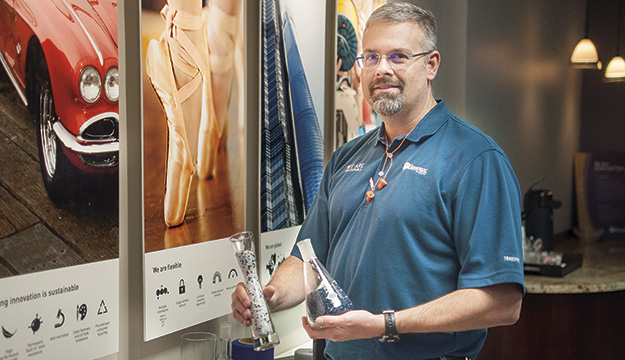Photo above: Tim Lawson
The second in a series of “Operation Tomorrow’s Workforce” articles by the United Way of Southwest Virginia
Brandon Turner grew up hearing about the local yarn factory, but never really having any idea what those words meant. “I’m from this area and I went to school with someone for years whose dad worked at ‘the yarn factory’ – that’s what he called Universal Fibers. Every time he told me that his daddy worked in the yarn factory, I pictured in my mind grandmas knitting. Now that I work here, it’s so funny to me.”

Brendan McSheehy, Jr.
Bristol, Va.-based Universal Fibers defies many outdated expectations. With additional manufacturing facilities in Europe, China and Thailand, the company defines what it does this way: “As the only solution-dyed fiber producer in multiple chemistries, our versatile products and capabilities begin with four core polymers; Nylon 6, Nylon 6,6, PET and PTT. Universal Fibers offers finished yarns in both single colors and multi-end specialties. We welcome orders in small to large lots in specifications to meet the unique needs of our global customers in diverse markets such as carpet, industrial, medical, filtration, military, rope and cordage.”
Does that sound like grandmas knitting?
“Most of the community probably doesn’t know what all what we do here,” said Turner. It’s likely an accurate statement, but it’s also troubling. Southwest Virginia is losing its population, by some estimates as much as 1,000 people per year. Yet if that population, especially the members of the younger demographics, remains unaware of the diversity of jobs available at existing companies, how can they be expected to stay?
Universal Fibers is a prime example of a company that offers great reasons for Southwest Virginians to stay. The company makes tons of specialized yarn to be used in high-performance products including parachutes, sports apparel, and flooring. What makes their product –commonly called “fiber” in their niche industry – unique is the coloring process. The melted-down solution is colored before it’s even made into fiber, so when the fiber is produced, the color is actually part of the fiber. For a visual comparison, Universal’s fibers are like carrots (the same color all the way through) whereas their competitors’ fibers are like radishes (colored on the outside but still white on the inside). Again, it’s not your grandma’s yarn.

Logan Pensinger
So, there are no knitting grandmas, and even though it is a large manufacturing facility, there are no dirty, crowded, dangerous floors inside, either.
Located in the industrial park in Washington County, Virginia, the company employs about 530 people locally, all of whom work in a clean, safe, air-conditioned, comfortable environment, whether in an office, the lobby, the conference room, or the factory.
“The dirty, dangerous, crowded environment is just the stigma associated with working in a factory,” said Tim Lawson, human resources manager. “And we are constantly trying to shift mindsets. That’s one of our biggest challenges.”
Lawson also explained that the production flow is atypical as well. “Some fiber plants would run one, two, or three products, and that’s a pretty old school model. We have more color changes per day than we actually have the number of machines for, so we are continually changing product and color. That’s very challenging, and it takes a high level of expertise to go from one color to another color on the same machine; a lot of people are needed to make that happen.”
Brendan McSheehy, Jr., vice president of Innovation, Sustainability, and IP said, “Many people don’t realize the variety of jobs within the company and how many people are needed throughout every step of the process. You have your actual manufacturing processes, and then you have the maintenance group that is there to support the manufacturing group. We operate 24/7, and if the machines are not running (right), we can’t manufacture the product, which is why there is a support side to everything we do. We have a whole slew of professional services that contribute – customer service, innovation, product and process development, marketing, sales, quality, accounting, and information technology. All of those have to come together with the manufacturing side. That’s why it’s so important that our associates can problem-solve, communicate, and get along with everyone they work with.”

Brandon Turner
Turner, now 35, has been with Universal Fibers since 2007, when his “knitting grandmas” theory was busted after his interview for an entry-level job in the manufacturing process. “When I got the entry-level job and had orientation, I was told, ‘Do every job you can.’ So I did.”
Turner kept his first job for a few years before working several other jobs on the manufacturing side of the process. Those jobs in the manufacturing process at Universal Fibers are closer to what you might expect in a traditional “factory”, including positions in logistics, purchasing, handling, coloring, extrusion, spinning, texturing, and quality.
“As I worked in those jobs throughout the manufacturing process, I watched other employees – like technicians – do their jobs,” Turner said. “That’s when I fell in love with the support side of the process.”
A surprising percentage of Universal Fibers’ workforce is comprised of associates on the support side. Positions on the support side are necessary for the company to run smoothly and include dozens of professional services jobs like the ones described by McSheehy.
“You are always trying to find that job you’re happy doing because it makes it easy to go to work,” said Turner. “I was happy doing every job that I’ve had here, but when I finally got the process technician job after several years and moved over to the support side, I began to feel like I was really engaged. I felt like I could troubleshoot and bridge gaps between the operators and the engineers. Then, I saw an opening in IT that also involved a different kind of troubleshooting, so I put in for that because I’ve always loved computers, and I got the job.”
Now that Turner is in IT, he addresses problems throughout the entire company. He can relate to the employees he’s helping because he’s been there.
Said Lawson, “I don’t know many corporations out there where you can seriously come in the door, start from scratch, bounce around and learn the process, and gain the skills to move up to a position like that.”
The availability of such opportunities in Southwest Virginia could help stem the flow of population from the region. Just as the people are hungry for good jobs, companies are eager to put good people to work.
The adaptability and curiosity required to bounce around and learn specific processes is a trait McSheehy agrees is needed in every organization – especially in manufacturing. “Manufacturing by its nature resists change, because the definition for quality is uniformity. But we need people on both sides of the process – manufacturing and support – who are willing to think differently. We are not the factory that makes black Model T’s.”
Adaptability is an important component of innovation, McSheehy’s area of expertise. Universal doesn’t just innovate products – but also support systems and jobs within the company. There have been many cases where someone at Universal Fibers has seen the value an individual could add to the organization, so they’ve brought that person on as an intern or employee.
Five years ago, Logan Pensinger was a senior majoring in chemical engineering at Virginia Tech. He called Universal Fibers to ask a few questions for a research project, and was amazed to find that the company in his hometown employed individuals from a variety of professions. His questions led to a larger conversation with McSheehy and then to full-time employment by Universal Fibers, where Pensinger has led a wide variety of innovation projects, including #D Printing filament. He now holds several patents and has acquired expertise in conducting and publishing Life Cycle Assessments.
Universal Fibers’ leaders say they are proud to offer a variety of good jobs to people in Southwest Virginia, just as they are proud of the people they employ. Turner and Pensinger are examples of individuals taking non-traditional paths to get to two different positions. They’re also examples of finding successful employment by remaining in or returning to Southwest Virginia.
“We want the next generation to know what careers are here – that you can come here with a high school diploma or a college degree,” Lawson said. “We want them to work in a career they love near their families and communities, and we want them to have a positive impact on Southwest Virginia.”




